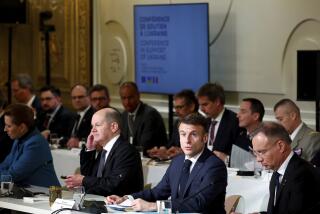Bonn Ready to Assure Poles on Postwar Borders
- Share via
WEST BERLIN — Under mounting pressure both at home and abroad, the West German government said Wednesday that it is ready to offer new, formal assurances that a reunified Germany would make no territorial claims against Poland.
After a Cabinet meeting in Bonn, deputy government spokesman Dieter Vogel said Chancellor Helmut Kohl is prepared to back a plan in which the parliaments of both West and East Germany would pass declarations pledging the sanctity of the present East German-Polish border.
Such a joint resolution could come immediately after East Germans elect their first democratic legislature of the post-World War II era on March 18, Vogel said.
“He has considerable understanding for what the Poles want,” Vogel added of Kohl.
Both East and West Germany have treaties with Poland that reaffirm the present border, and Kohl backed a similar West German parliamentary resolution last fall before a visit to Warsaw.
However, his visible reluctance to clarify German intentions on the emotive question since reunification suddenly emerged as a near-term reality several weeks ago has unsettled Europeans and dismayed many Germans.
Polish government officials, expressing fears that a reunified Germany might some day argue that the treaties are invalid because they were signed by nations no longer in existence, have gone so far as to ask that Soviet troops stay in Poland to help guarantee the borders, at a time when all other East Bloc countries are asking for the swift removal of Soviet forces.
Kohl’s failure to speak clearly on the issue has put him at odds with his own foreign minister, Hans-Dietrich Genscher. At a political rally in the East German city of Erfurt on Wednesday, Genscher repeated what Kohl seems to find so difficult to say: “The people of Europe need to know that we raise no territorial demand against anyone, either now or in the future.”
The United States, which backs unification without the misgivings apparent in many European capitals, is also less than satisfied with the chancellor’s recent statements on the issue.
Kohl’s stance appears linked more to the intricacies of domestic German politics than any covert desire to recover land lost by Germany to Poland as a result of World War II, political observers say.
Yet the degree of upset caused by his elusive stance reflects how deeply sensitivities about a powerful, united German state still run in Europe.
Sources in the chancellery indicated Wednesday that Kohl might be prepared to shift still further to counter these concerns. An aide said the chancellor is actively considering a proposal made last week by Polish Prime Minister Tadeusz Mazowiecki calling on both German states to enter immediate negotiations with Poland on a treaty that would effectively put the controversial border issue to rest.
According to the Mazowiecki plan, the representatives of East and West Germany would initial the treaty, which would then be signed and ratified by a unified German government.
A quirk of history that still leaves Europe without a formal peace treaty ending World War II also gives only a unified Germany the right under international law to negotiate a treaty fixing the Polish border along the present line of the Oder and Neisse Rivers.
“We’re examining this idea very carefully,” a Kohl aide said. “There is no fixed position on this yet.”
Kohl has consistently parried requests for reassurances on the border issue by noting that only a reunified Germany can deal with it. Few dispute that he is legally correct but many, including Genscher, believe that a strong political statement renouncing any territorial claims, such as the joint parliamentary declaration, is vital if reunification is to carry broad-based support.
“For him (Genscher), it’s not a question of political style, it’s an absolute prerequisite for unity,” explained a Foreign Ministry official. “The Dutch, the French, the Belgians, you name them, they feel they need these assurances.”
Kohl’s reluctance to participate in such a move appears to stem from his fear of alienating an important domestic constituency, the estimated 2 million Germans who still nurture strong cultural links with the regions of Silesia, Pomerania and East Prussia, all lost as a result of the war.
Roughly 44,000 square miles of land, including such cities as Breslau and Oppeln, in what was eastern Germany when the war began, became western Poland after the war. Nearly 11 million people, roughly one-fifth of West Germany’s population, were expelled from these regions in the early postwar years and resettled in West Germany.
Those who actively maintain their heritage through cultural organizations belong almost exclusively to the moderate German right from which Kohl draws the bulk of his political base. While organizations of these expelled people reject the idea of trying to retake former German areas by force, they do demand compensation for lost property.
More to Read
Sign up for Essential California
The most important California stories and recommendations in your inbox every morning.
You may occasionally receive promotional content from the Los Angeles Times.













